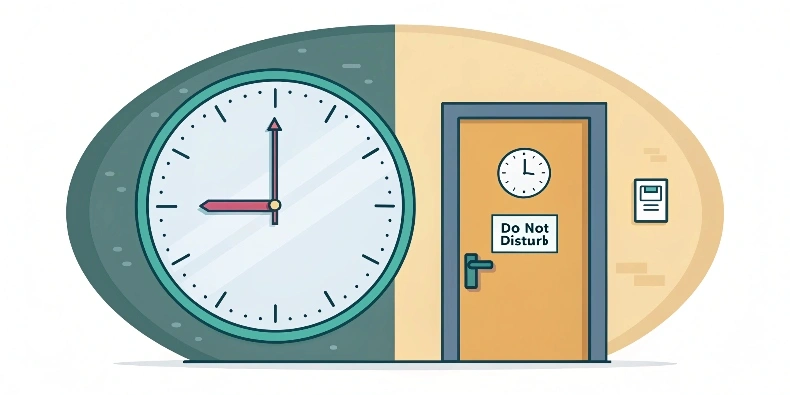How to maintain work-life balance: practical strategies and tips

Work-life balance isn’t a luxury — it’s a necessity in a world where the lines between personal and professional life grow blurrier by the day. Constant connectivity, after-hours notifications, and ever-rising expectations can quietly burn you out from the inside. That’s exactly why the ability to set boundaries, manage your energy, and carve out time for yourself has become a vital skill.
In this article, you’ll find practical strategies to help you preserve your energy without losing sight of your career goals — and, most importantly, without losing yourself. You’ll learn how to build a sustainable system of priorities and find that elusive point of equilibrium between work and personal life.
What is work-life balance?
Before trying to achieve balance, it’s worth understanding what it actually means. It’s not about perfectly splitting your hours between the office and home. Balance means having enough time and energy not just to complete your work tasks, but also to rest, connect with loved ones, take care of yourself, stay healthy, and pursue personal growth. It’s that internal sense that you’re not being torn between responsibilities, but living at a pace that genuinely works for you. When work doesn’t drain you to zero, and your personal life doesn’t feel like a second shift — that’s real balance.
According to Randstad’s global 2025 survey, 83% of employees worldwide rank work-life balance as their top priority — even above salary (82%). This highlights that the pursuit of harmony isn’t a luxury, but a real need that more and more people are placing at the center of their lives.
| Причина дисбаланса | What to do about it |
|---|---|
| Constant availability in messengers | Set boundaries for work chats; turn off notifications at night |
| Blurred lines between work and home | Create a clear schedule and a designated workspace |
| Overload | Learn to delegate and say “no” |
| No personal time | Schedule rest as seriously as you schedule meetings |
| Procrastination and lack of structure | Build a realistic daily plan with clear priorities |
How to find and maintain a healthy work-life balance
1. Structure your day thoughtfully
A clear daily rhythm helps you stay focused. Make space not only for work, but also for rest, exercise, personal time, and even doing absolutely nothing. It’s not just how much time you spend, but what you spend it on. Quality matters — even thirty minutes of true rest can be more valuable than an entire evening spent worrying about work.
2. Clarify your priorities
You can’t do everything at once — and you don’t have to. Get clear on what really matters to you: in your work, your relationships, and yourself. Set specific goals and allocate your energy not to what feels most urgent, but to what’s truly important. Real balance starts with an honest look at what you choose day after day.
3. Plan your day
Planning isn’t about rigid control — it’s about clarity. In the morning or the night before, outline what you want to accomplish, including both work tasks and personal time. That way, your day won’t slip through your fingers, and you won’t be left wondering where all your time went.

❌ Common pitfalls on the road to balance
Even the most driven people sometimes sabotage their own efforts to create balance. Here are a few common myths that often get in the way:
- Answering emails late means I’m being productive
Working nights and weekends isn’t heroic — it’s a shortcut to burnout. Real productivity is built on clear priorities, not long hours. - You have to be available 24/7 to stay relevant
Responding instantly doesn’t mean you’re reliable. What matters more is your ability to step away and return with a clear mind. - Rest is a reward for getting things done
In truth, rest is the fuel for getting things done. If you wait until your to-do list is finished to relax, you may never get there. - A good balance means everything is split 50/50
Balance isn’t about symmetry — it’s about a sense of inner calm and sufficiency. Sometimes, two focused evening hours mean more than an entire distracted day. - The more I do myself, the better
Perfectionism and micromanagement are common enemies of balance. Delegating is an act of trust — and trust makes room for a fuller life beyond work.
Effective delegation
1. Know where you add the most value
When you’re clear on your strengths, you can focus your time and energy where they have the greatest impact. Everything else isn’t a weakness — it’s an opportunity to delegate. Don’t hesitate to hand off tasks that others can do faster, better, or with less effort.
2. Invest in your team
Delegation is built on trust — and trust starts with preparation. Support your team’s growth: provide training, give them space to act independently, and communicate the bigger picture. People who understand the why behind their work perform better and are more likely to take ownership.
3. Be clear about tasks and expectations
Lack of clarity is the enemy of effective delegation. Define the task, deadline, and desired outcome in specific terms. Ask if everything is clear, and agree on how feedback and updates will be shared. This prevents confusion, reduces rework, and eases unnecessary stress for everyone involved.
Boundaries and personal time: how not to lose yourself in work

Draw a clear line between work and rest
Set specific hours for when you’re working—and when you’re not. When the workday is over, emails and tasks can wait. That time is yours: for your family, for yourself, for life beyond your job.
In 2024, the company Dcdx adopted a four-day workweek with Mondays off, which led to higher employee motivation and satisfaction (New York Post). This is yet another reminder that respecting boundaries isn’t a luxury—it’s a real path to resilience and productivity.
Learn to say “no”
Not everything is urgent, and not everything is yours to handle. If a new task cuts into your rest time—say no. Putting your boundaries and needs first isn’t selfish; it’s a mature act of self-care.
Take a “digital break”
Sometimes the best way to recharge is to close your laptop and silence your phone. Set time aside to go fully offline. Stepping away from the constant stream of notifications helps your mind breathe and return to center.
In Australia, as of August 2024, the “right to disconnect” law allows employees to ignore work messages outside of business hours.
Checklist: How to reclaim your balance
- 📅 Plan your day with personal time in mind.
- 🚪 Set boundaries—at work and in your relationships.
- 🙅 Say “no” without guilt.
- 📴 Take at least one digital detox each day.
- 💬 Discuss workload and expectations with your manager.
- 🧘 Schedule time for things that restore you: exercise, reading, quiet.
Self-Care and Growth Beyond Work
Take care of your body and mind
Health isn’t an add-on to success—it’s the foundation of it. Regular movement, good sleep, and balanced nutrition aren’t just ideals from self-help books; they’re practical ways to maintain energy so you can thrive instead of just survive. Listen to your body—it always knows when it’s time to slow down.
Grow as a person
Personal growth doesn’t have to mean courses and certificates. Sometimes, all it takes is a good book, a meaningful conversation, or an hour of quiet with yourself. Make space to explore, learn, question, and rethink. This gives life depth and color—and reminds you that fulfillment can come from more than just work.

📊 5 Steps to work-life harmony
- 💡 Identify what truly matters to you
Define your values and priorities—they’re the foundation of real balance. - 🕒 Build a schedule that includes personal time
Plan not only your work but also your rest, connection, and self-care. - 🚫 Create a clear boundary between work and life
Draw the line—and don’t be afraid to say “no.” - 🤝 Delegate and share the load
Trust others with responsibility. It’s not weakness—it’s maturity. - 🌱 Nurture yourself and keep growing
Make space in your routine for things that nourish you—exercise, books, hobbies, stillness.
Conclusion
Work-life balance isn’t a myth or a luxury—it’s a skill you can build. It takes awareness, honesty, and regular tuning, but it starts small: a structured day, clear boundaries, the ability to delegate, time to rest, and room for yourself.
By applying these simple yet powerful strategies, you can create a space that allows both work and life to thrive. And the stronger your balance becomes, the easier it will be to feel centered, alive, and truly fulfilled—not just during office hours, but far beyond them.



